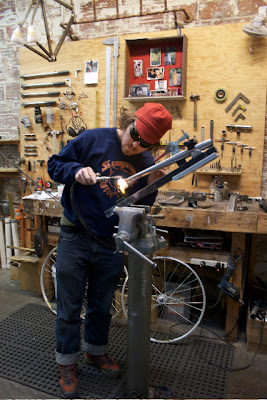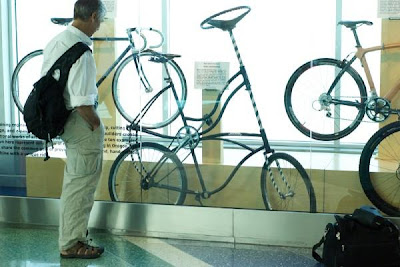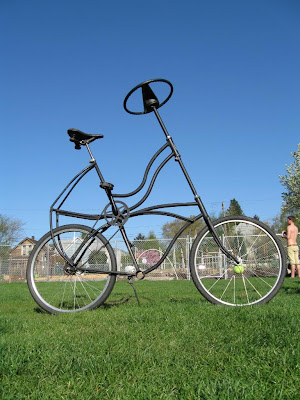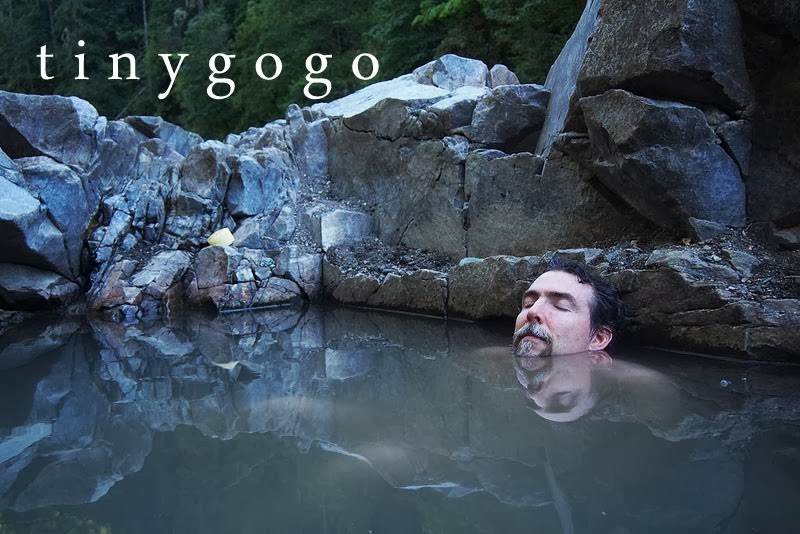As a faithful scooterist, it's been a bit tough living here. On one hand it’s extremely exciting seeing the changes taking place. Bicycle shops are opening up all over the city. The city is putting in on-street bicycle parking on many business corridors. Anywhere, and at any given moment, there are bicycles on the streets all around you. On the other hand scooters and motorcycles seem to have been left behind in the city's transportation planning.
I have personal conflict too. I have to admit I’ve been riding my bike more than scooters. After a couple of scary doctor’s check-ups I started biking as a health necessity. Also it’s hard not to get wrapped up in the passion and excitement of being in the midst of a real revolution. I remain a committed scooterist but the excitement in Portland right now is with bicycles. So, as it goes, I suffer pangs of guilt many mornings when I pedal past my scooters on the way to work.
Exploring the world of bicycles, by odd coincidence, I came across a couple interesting stories of two Portland individuals who were pulled away from scooters into the vortex of the local bike fervor. They both took very different paths into the world of bicycle fanaticism. One, Sacha White, is a highly regarded custom bike builder. The other, Mark Veno, has immersed himself into the tall/freak-bike scene, building and hanging out with people who are into custom rat bicycles.
The stories of these two are interesting by themselves but they are also a great opportunity to reflect on the scooter/bike relationship. Maybe there are some insights on how we can keep the passion alive in scootering? Maybe we’ll find some dead ends, but also maybe there are commonalities. Are there bridges between the two interests and communities? Both are, after all, efficient two-wheeled transportation. Both are still vulnerable minorities on roads dominated by cars.
Meet Sacha White, owner of Vanilla Bicycles
Here Sacha White holds forth, sharing his bike building knowledge with a small group of cycling enthusiast who were on a tour of some of Portland's custom bike builders
I first met Sacha White in 1997. Mr. White had moved out to Portland from Colorado where he had been a member of an early club, Fun and Games SC. The club included members who went on to form the Colorado shop franchise, Sportique. Once in Portland Mr. White spent time hanging out with the Twist and Play SC, meeting Tuesday nights downtown at the Shanghai Tunnel. That same year, for Spring Scoot IV, he brought out a drop-dead beautiful green Lambretta GP with “gull wing” side panels. Many of us were dumbstruck by the beauty and crazy level of detail that went into this bike. It was a custom bike that seemed to take Bertone's redesign of the Series 3--one that cleaned and simplified the lines of the scooter--to a new level of purity. (The bike was later featured in issue #2 of Scoot! Quarterly magazine.) Sadly, not long after this we saw less and less of Sacha. We heard that he had become a bike messenger and that he had a new family member on the way.
(photo used courtesy of Jeff Allen)
Flash forward to the present day. I am hanging out on local bicycle web sites such as bikeportland.org. I learn about Portland’s thriving independent custom/hand-made bicycle craft builder community. One builder stands out. This is Vanilla Bicycles. Somewhere I saw a photo of the owner. It took me a while but I eventually made the association between Sacha White the scooterist and Sacha White, the world-renowned bicycle manufacturer. It made sense of course. It was immediately evident that the level of care, artistry and inspired creativity that went into his scooters would go into bicycles.
Today Mr. White is totally consumed with his job. His from-the-ground-up careful thinking that goes into each and every bike is in keeping with his earlier work with scooters. The shop is well known for innovative, often subtle, design ideas that are elegantly integrated into the each bike. As testament to Vanilla Bicycle's world reputation, one of his creations was featured on the cover of a recently-published large beautiful coffee table book, Custom Bicycles, A passionate pursuit.

One wonders in what sort of ways working on scooters helped Mr. White cut his teeth for a career in building bicycles. Did fine Italian design influence his approach to bicycles. Was he attracked to bicycles because they are so less damn frustrating to keep running? Mr. White has agreed to give an interview for us but between a five-year customer waiting list, trade shows and moving his shop, he simply has not had the time. We eagerly look forward to learning more of Mr. White's thoughts on the subject.
Meccanico di Veno, Inside the grimy machinations of an artist mechanic
Mark Veno arrived in Portland sometime around 2002. Mr. Veno like Sacha White began showing up Tuesday nights at the Shanghai Tunnel and also for the Portland scooter scene's regular Friday happy hour gatherings. Mr. Veno's lone ride was a wild redesign of a standard P-series Vespa where the body was totally altered. This scooter, to me, had San Diego written all over it. I could tell that it grew organically out of Mr. Veno being immeresd in the local scene down there. It reminded me of a few bikes and many custom hot rods I saw there during Amerivespa 1999.
After a few years Mr. Veno moved on to other interests. Many of us wondered if he was still in Portland. A few years ago there was an installation of handbuilt bicycles from Oregon on display in the Portland Airport. The display included a wide diversity of bicycles from Sacha White's and other custom bike builders' high end bespoke creations unique production bikes such as Bike Friday's folding bikes and Comotion's tandems. There was also a "tall bike," essentially a double-decker bike. This one had a car steering wheel for handle bars. This bike was dubbed "Reverse Cowgirl" and credited to the Drop Out Bike Club. Elsewhere later I saw that Mark Veno played a big part in the bikes creation.
Around the same time I began seeing posts on local Portland bicycle discussion boards by "SkidMark." The comments bore the distinct likeness to the Mr. Veno I knew: often opinionated, sometimes un-PC and sometimes insightful. I contacted SkidMark to see if he was indeed Mark Veno. It turned he was and, yes, he'd be willing to share some time with us to discuss his artistic life with scooters and now bicycles.
DAVE MCCABE: So let's start with the basics. When did you first start riding scooters. Where were you and where did it go from there?
MARK VENO: 1987. I was living in Somerville, Massachusetts and I bought a Vespa P125X on a whim for $200. I was into air-cooled VWs at the time and the fan-cooled engine and spare tire appealed to me. I didn't know anything about mods or scooterboys at the time. I sold it when I moved to Minneapolis the following year. Not long after that I picked up a fashion magazine called The Face and it had an article titled, Mutant Mods. It was basically about Scooterboys and their crazy Vespa and Lambretta cutdowns and choppers. Now I had seen plenty of Harley, Brit and Japanese choppers but never a scooter chopper. I knew I had to have one again, and I knew I had to cut it down.
I was also very into bicycles and especially BMX, and Southern California was the mecca for BMX, so I moved to San Diego. I had a friend, Rich Hansen, who lived in San Diego and worked for Haro Bikes. He got me in to talk to Bob Haro about doing some drafting for their next year line-up. At the time I was still working as a draftsman, and being a bicycle techno-geek I knew about frame geometry. I drew their new front-suspension MTBs and first 24" BMX cruiser and Linn Kastan prototyped them.
The thing I noticed immediately upon getting there was Vespas and Lambrettas all over the place. I bought a seized up P200e from Fabio Ballarin that was being used as a jig from making expansion chambers for $200. I brought it home and cut off the front fender and discarded the cowls. I poured some Marvel Mystery oil down the spark plug hole and knocked the piston loose with a block of wood and a hammer the next day. A new spark plug and it was running. A cutdown Vespa was born. From there I just kept going with it, getting frames and engines and parts, and making parts, and cutting, and fabricating, and making them go faster. I fell in with the Nightstalker Scooter Club and met Tim Stafford and Jay Tellier, who we all know as TJ Scoots. They taught me everything I know about reed induction conversions, mixing late model engines and suspensions with early frames, even basic bodywork. Any time I wanted welding done I had Tim do it, because he is one of the best TIG welders I've ever seen. I'd do the fabrication and have Tim zap it up. My first reed induction cases were from Tim and it didn't take long for me to build a top-end that was capable of destroying clutches and shifting cruciforms. Then one day it sent the primary cluster through the back of the case, so I did the cases I have today with the RD400 reed enclosure welded on. Both of these engines travelled through several frames. One was an Allstate 125 with 10" wheels, most of them were cutdown P200e's some racer style and some choppers, with a cool little peanut tank.
MCCABE: Your style of work, whether scooters, motorcycles or bikes tends to be rat rod custom. Where does this come from. Is it from San Diego?
VENO: I grew up with hot rods, I was always a big fan of Ed Roth, and Von Dutch. Later on I found out about Indian Larry, those guys are like the Holy Trinity of customizing. The whole SoCal hot rod/custom revival thing hadn't really started yet, because a lot of those guys were still building and riding Italian scooters! So it was a style I was into anyways, and it was going on around me, too. Basically American style hot-rodding crossed with the British/UK/EU Scooterboys style of building cutdowns and choppers. Later on I built a Suzuki T500 cafe racer, and a Yamaha RD400, because of what I had learned about building fast two-strokers. All these bikes were in spray paint or primer because that is what I could afford, after dumping most of my coin into the engines, tires and suspension. I also took about two years building a show-quality Vespa chopper, and within two weeks of it getting put on the road I was left-hooked by an old lady in an Olds 98. This was my first "I didn't see him!" and my last "nice" bike.
MCCABE: What are you currently working on?
VENO: I'm coming up with a prototype for a track frame that I plan on producing myself under the name Meccanico di Veno. Still in the planning stages. I'm doing a lot of bicycle wheelbuilding, and building a bicycle here and there, either for myself or to sell.
MCCABE: How did your stretch P, the one you brought with you from San Diego, come about?
VENO: I never liked how a Vespa sat at such an angle with an extended fork so I decided to do a frame with a vertical stretch. Jay had done one with a horizontal stretch, so I had to do something different. I also rode two-up quite a bit, so it was always a little cramped. The 4" up stretch is also 2" out, just about perfect. Thing was it didn't look like a chopper anymore so I replaced the 4" fork with a 7-1/2" over fork, with some aluminum spacers I turned out of hex bar stock on the lathe. To get the trailing link angle right and get a decent amount of trail, the spacers are shorter, about 6-1/2" long.
MCCABE: How did you end up in Portland. Was it Cirque du Soleil? Do you still work with them when they come to town? If so, can you get me tickets? Ha!
VENO: I came up to Portland with Cirque, and stayed when I met an exotic dancer and started seeing her. She broke up with me on Christmas Eve, she always did have a flair for the dramatic. About a year later I met Mirand, who I am married to now. I have a nice quiet life in the suburbs with her 2 daughters from a previous marriage. They are great kids and it's been amazing watching them grow up, and being a part of that. I probably would have moved back to San Diego if I hadn't met her.
I still work for Cirque when they come to town, I've worked for them in Seattle too. They used to give you 2 tickets and let you see the show, now they just give you one extra ticket, so that's obviously reserved for my wife. Join Cirque club online, and you'll be emailed when the tickets get discounted near the end of the tour.
MCCABE: Damnit. Thought I'd ask anyway. Still I get the sense that the circus works its way into your artistic sensibilities.
A few years ago we began seeing less of you. Last year I ran across the hand-built bike display at the Portland Airport. It was in this display that I saw the steering wheel bike entered by Drop Out Bike Club. This is how I discovered you had gotten into bikes. Did you have a hand in this bike?

VENO: Meeting Mirand and moving out here has a lot to do with it, but the main reason I stopped riding scooters is because people drive so slow and so badly compared to what I was used to in San Diego. There is just too much traffic and you can't lane split. It rendered my scooter pointless, and made riding it frustrating. It was on it's way out, needing to have the clutch primary gear re-riveted. The crank had also been way out of true, causing the stator plate to crack, because it was hitting the flywheel. I replaced the crank, and then the stator plate broke, and I said "fuck it". Around that same time I had started noticing fixed gear bikes all over town, and it reminded of the bike messengers I used to hang out in Harvard Square with, I decided to build a fixed gear bike. Using the same tactics I used to build Vespas, I started building bikes. I also met the folks that started Zoobomb at this time. From there I was introduced to the whole freakbike thing: tallbikes and choppers. I built the bike that was displayed at the airport back then and named it Reverse Cowgirl. The steering wheel came a little later. All the fabrication on that bike was done by me. Not long after that Drop Out Bike Club started up, and they asked me to join. When I showed the bike I wanted the whole club to get credit. Around that time we were also asked to have a booth at the Oregon Handmade Bike Show and a year later we showed at Oregon Manifest. I think the only other freak bike club that has showed at a professional framebuilder's show is Black Label, it's kind of a rare occurance, and some sort of testimony to the level of design and aesthetic we put into our freak bikes, I suppose.

MCCABE: Did you know that Sacha White of Vanilla Bicycles was into custom scooters before he became an custom bike builder? There were two scooterists in that airport display.
VENO: I think Sacha may have told me that a long time ago.
MCCABE: How did the Drop Out Bike Club come about? Are you still active in it? Did Zoobombing have anything to do with you getting into bikes here in Portland?
VENO: The big joke is that we are drop duts from Zoobomb, and we are. Most of us are actual dropouts, either from school or society. I am an art-school dropout. We still Zoobomb occasionally and are active within the bike community, and try to keep the focus on building and riding freakbikes. Lately I've been obsessed with building my own track frame, and building a 26" rigid singlespeed MTB frame, so my focus has kind of shifted towards "real" bikes. I still love working with existing bikes and creating something custom, but I really want to take it to the next level. I want to build frames, I want to start a bike company, maybe eventually do production bikes as well as handmade custom frames. I've also been trying to get back into BMX. To me it's all the same, it's all two wheels. I've been working on a Triumph chopper forever, the statement I made about driving/riding in Portland are why it is such a back-burner project. But I love it all, it's been about two wheels since I was 15 and built a "P.K. Ripper" from the frame up, even building the wheels. FTW to me means Forever Two Wheels.
MCCABE: So, don't hold any punches, what happened with you hanging out in the scooter scene? Did you become an environmental fanatic or something?
VENO: I just moved on, I went somewhere else with my life. It's just not about hanging in bars and gallivanting anymore. It's why I don't Zoobomb anymore either. I stopped drinking as well, I'm sure that has a lot to do with it. I miss drinking good microbrewed beer, but my stomach won't handle it, I had the worst acid-reflux. More importantly my family takes up a lot of my time and I like it that way.
MCCABE: I used to have really bad drinking-related heart burn. I quit the sweets, particularly soda pop and now I don't get it. So how about the environmental angle?
VENO: I could never be an environmental fanatic. I love big V-8s, noisy-ass hot rods burning rubber and releasing way too many hydrocarbons by sucking too much gas through too many carburetors. I love loud-ass choppers with big twin cylinder engines, whether V or parallel. I would love to get the Vepsa running, pre-mix it 32:1 and do some burn-outs. I see it as a vice, sort of a sin against the environment. The production of meat hurts the environment more than all automobiles do, and old hot rods, motorcycles, and scooters are such a tiny part of that. You could reduce your carbon-footprint more by being a vegetarian than by giving up your Vespa.
MCCABE: Interesting stuff Mark. I hope you keep on doing what your doing.
VENO: Thanks! If people want to see more of what I'm doing my blog is Meccanico di Veno at www.meccanicodiveno.blogspot.com

I have found bike-friendly is usually scooter-friendly as well. When I first got a scooter, I did most of my riding on routes designated by the city of Seattle as bicycle friendly, mostly due to lower traffic volumes. Of course, Portland's bicyclists for the most part are courteous, civilized folks who actually obey traffic laws; in Seattle, bicyclists are passive-aggressive turds who can't be bothered by things like stop signs and the rule that says you ride on the right-hand side of the road with the other traffic...
ReplyDelete__Orin
Scootin' Old Skool